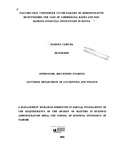| dc.contributor.author | Nasieku, Tabitha | |
| dc.date.accessioned | 2013-05-10T10:42:03Z | |
| dc.date.issued | 2006 | |
| dc.identifier.citation | MBA | en |
| dc.identifier.uri | http://erepository.uonbi.ac.ke:8080/xmlui/handle/123456789/21274 | |
| dc.description.abstract | The purpose of this study was to determine the role of administrative receivership in the
recovery process of a firm and determine the factors that have attributed to the failure of
administrative receivership as a company's rescue mechanism in Kenya. The study
focused on all the commercial banks and non banking financial institutions (NBFIs)
registered and licensed under the Banking Act that were placed under central bank of
Kenya (CBK) statutory management between 1993 and 2004:
The researcher used both primary and secondary data to attain these research objectives.
Primary data was collected using questionnaire method while secondary data was
collected from the documents available at the CBK. The administrative measures put in
place by the receiver manager and why those measures could not help turn-around failed
financial institution are also discussed in the paper. Further issues, relating to the general
causes of bank failure in Kenya were looked into. This was done in an attempt to help
reduce the possible causes of administrative receivership failure. Since most of the data
collected was basically qualitative, the researcher used content analysis to analyze the
findings of the study.
From the study, the main administrative measures that were put in place by the receiver
managers in their effort to turn around-failing financial institution included the following;
the scheme of arrangement, cost management, and human resource management.
Howeve7 these measures are always frustrated dUe to lack of company stakeholder's
support. Recei vers are also not so pillared in Kenya and the process of administrati ve
receivership is perceived to be an expensive event that destroys a business. Likewise,
some company failure causes such as political interference, are beyond the powers and
capabilities of the receiver managers. These findings are consistent with the literature.
Thus administrative receivership may not be an appropriate remedy to company failure.
VI | en |
| dc.description.sponsorship | University of Nairobi | en |
| dc.language.iso | en | en |
| dc.publisher | University of Nairobi | en |
| dc.subject | Receivership | en |
| dc.subject | Commercial banks | en |
| dc.subject | Nonbanking Financial institutions | en |
| dc.subject | Kenya | en |
| dc.title | Factors that contribute to the failure of administrative Receivership; the case of commercial banks and nonbanking Financial institutions in Kenya | en |
| dc.type | Thesis | en |
| local.publisher | School of Business, College of Humanities and Social Sciences | en |

